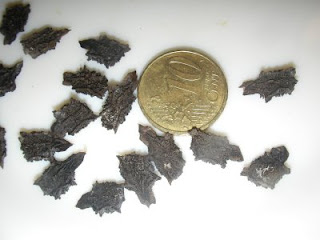He is touring France in September and giving workshops there, before moving on to Denmark and Germany, then he will be in Ireland before visiting the Isle of Man where his grandfather came from, and finally the UK.
To get an idea of what he does have a look at his blog Tater Mater.
Tom has been breeding potatoes and tomatoes for over 50 years. He has created hundreds of varieties including potatoes resistant to blight,
He will be talking about what an independent breeder of tomatoes and potatoes does and possible release of new lines of potatoes and tomatoes.

Some of the topics that will be covered will be:
The history of Tater Mater Seeds
The development of some of Tom’s classic tomatoes such as the Green Zebra, along with dozens of other varieties that are available in the open market.
How Tom is rapidly accumulating a large germplasm of potato clones and TPS (True Potato Seed)
Hands on demonstrations of how to cross tomato and potatoes, many times with actual plants and with video and power point presentations.
Tom will talk about how he has taken just a few varieties of potatoes and tomatoes and created a vast diversity of seeds for the future. By using heritage potatoes and tomatoes, and adding some newer releases to cross with, Tom is working with these to create tomorrow’s heirlooms.
Tom will discuss making F-1 hybrids that anyone can make over and over again. He will talk about making backcrosses and taking each year’s seed increase to the filial level of F-5 on tomatoes which indicates a rather stable line. Tom will illustrate how his potato lines have better berry production which aids hybridization efforts.
Tom will talk about the nutriceuticals of tomatoes and potatoes; the essential nutrients that these crop could contain with a bit of breeding expertise. Enhanced antioxidants, anthocyanins, carotenoids, lycopene, are but a few. Fast cooking times in his new potatoes clones that cook in 5 minutes in boiling water will be featured in his topics.
Through a variety of breeder/grower initiatives beginning with the workshops, there will likely be many cooperatives dealing with plant breeding and variety development starting with seeds of Tater Mater.
These workshops will be part of an effort to keep seeds free and available to the public and not be allowed to be controlled by major seed companies, universities, or governments.

A concerted endeavor will be launched to work with local heritage varieties to incorporate them in variety improvement and to avoid GMO’s at all levels.
Potatoes can be grown from true seed and avoid the virus contamination of tuber trades. TPS is but one way to foster diversity and reach local needs for flavor, storability, yields, disease resistance, all with organic growing methods
The workshops will features many ways to look at seed extraction, seed saving, clonal selection.
Single seed descent and bulk population breeding and variety maintenance will be discussed.
The workshops will try to feature local gardens and local growers.
The goal is to find ways for this to help Tom in his work and how he can help local growers in return.
Video and audio recording will likely be part of many of these workshops. Some of those may be shown at succeeding workshops to show the growth of the information exchanges. A few clips of how to cross potatoes and tomatoes may be linked to the Tater Mater blog. Many still photos will be shown of his tomato and potato varieties.
Each of these workshops will invite anyone to submit questions to answer during the workshops and/or later in an interactive format. With sufficient interpreters present, these answers will be delivered in the original language.

Workshop fees will go towards Tom’s travel in Europe and to free up important new seeds to be introduced. As Tom devotes more and more of his time to being a seed ambassador of sorts, these fees will help continue his workshops towards the future.
The goal of Tater Mater Seeds is to get young people involved in plant breeding, therefore, if Tom can be a mentor and teacher for many potential plant breeders, justice is done.
During Tom’s 56 years of breeding plants, he has not only proven that anyone can be a home garden plant breeder but will show many how they, too, can be plant breeders. His unique collection of proprietary seeds of tomato and potatoes will be a great resource for plant breeding groups in each nation.
Tom started out breeding plants on his family farm near Lancaster, Kansas. He kept a family heirloom bean alive and growing each year in his gardens from a few beans his great grandmother brought to the USA in 1888. He kept growing new selections out of his breeding work even while he obtained degrees in Anthropology, Botany, Geography, and Education. His career includes farming, managing garden centers, managing greenhouses, potato buyer, potato and tomato breeder under contract, teaching, seed catalog, and a wide host of other professions. He has offered many of his creations in Farmers’ Markets and has introduced his varieties to other organic growers.
Tom stays busy with his TaterMaterSeeds forum and is a moderator on the Tomatoville.com for CrossTalk and Potato sub forums.
Tom currently lives in Everett, WA. His plots are all organic and shuns any chemicals applied to the soil.

















